I. Introduction
Today we are going to wrap up our study of 2nd Peter, and as you may recall, Peter was considering his imminent death and wanted to leave behind words of strength and encouragement to the early church.
Those were difficult days for Christians. During the first few years after the death of Jesus, Christians were considered a sect of the Jewish religion. This sect was led by Paul, Peter, James, the brother of Jesus. But in 62 AD, the Jews stoned James to death, and hostilities between the Christians and the Jews were cemented. Then the Romans withdrew official protection from the Christians two years later. Then came the Great Fire in Rome, and legend has it that the emperor Nero fiddled while Rome burned. It was not a very accurate legend; we know that Nero was 35 miles away when Rome burned, and the fiddle hadn’t been invented yet, but hey, it’s a good legend and makes for some nice imagery. Nero did however use the Great Fire for political gain, and blamed the Great Fire of Rome on Christians, and outright persecution of the Christians then began in earnest. Peter writes his letter to the church 31 years later in 95AD after decades of persecution and being fed to lions to reassure Christians. Peter wanted them (and us!) to know about our eternal life and how we should live while we wait.
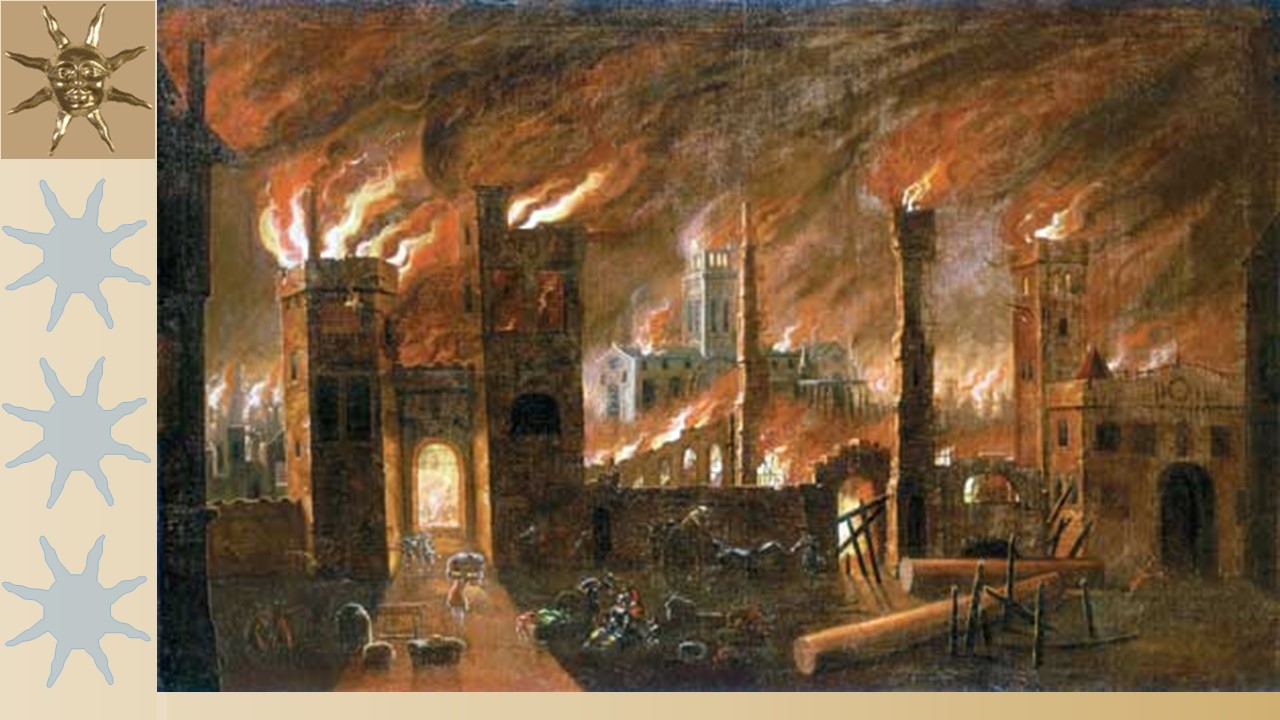
The persecution that Peter mentions in 2 Peter 3 is probably better translated as “sufferings.” The letter was probably written to churches as far away as Corinth, outside of Rome, and these Christians probably were not being fed to lions. 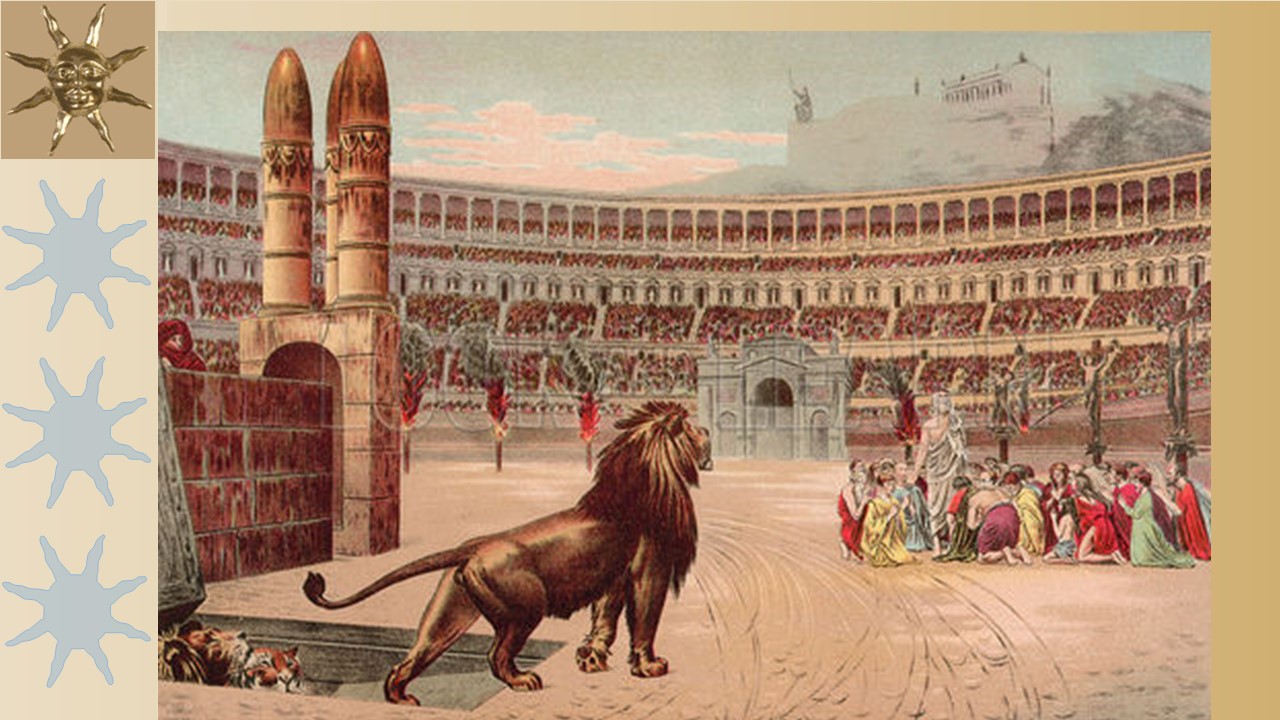 While some persecutions of Christians existed, probably due to local governors sympathetic to Nero, it was more likely these Christians were subjecting themselves to antinomianism, the belief that grace is so sufficient, that morality is of no use. As Paul says in Romans 5:20,
While some persecutions of Christians existed, probably due to local governors sympathetic to Nero, it was more likely these Christians were subjecting themselves to antinomianism, the belief that grace is so sufficient, that morality is of no use. As Paul says in Romans 5:20,
Where sin increased, graced increased all the more.
We are saved, dudes, and there’s nothing we can do to lose it, so let’s party on. But this attitude is Christian anarchy.
Even today, this very liberal view of Christianity is very widespread. “If God loves me and I cannot lose my salvation, then why not enjoy the good life? Why not spend all my time and money on pleasure? God will forgive me.”
But this is like an engaged woman saying, “He loves me and he’s going to marry me, no matter what I do. Why not play the field a while longer?” It shows a one-sided love. It shows God’s love for us, but it also shows we don’t truly love God back.
Antinomianism is not true Christianity – Paul addresses this in Romans 6:1-2,
What shall we say, then? Shall we go on sinning so that grace may increase? By no means! We are those who have died to sin; how can we live in it any longer?
Antinomianism is a false teaching, and it is likely that Roman immorality and paganism was embraced by these false Christians, perhaps to better fit in with the Roman culture, who then either taunted or lured Christians away from their life of purity. And it is in this setting that Peter writes to the church about our hope in Jesus forever. One day the Lord will harvest His crops in love, and the weeds will perish in the fire and the believers will dwell with the Lord forevermore.
II. Resist and Rest, 2 Peter 3:1-7
So let’s open to 2 Peter 3 and look at the first 7 verses –
Dear friends, this is now my second letter to you. I have written both of them as reminders to stimulate you to wholesome thinking. I want you to recall the words spoken in the past by the holy prophets and the command given by our Lord and Savior through your apostles.
Above all, you must understand that in the last days scoffers will come, scoffing and following their own evil desires. They will say, “Where is this ‘coming’ he promised? Ever since our ancestors died, everything goes on as it has since the beginning of creation.” But they deliberately forget that long ago by God’s word the heavens came into being and the earth was formed out of water and by water. By these waters also the world of that time was deluged and destroyed. By the same word the present heavens and earth are reserved for fire, being kept for the day of judgment and destruction of the ungodly.
Ok, in verse 3 we are warned that in the last days, scoffers will come. And what will the scoffers be doing? They will be scoffing. I am certain I have never called anybody a scoffer, it just sounds funny. Robitussen Scoff Medicine. I’d use ridiculing, making fun of… I guess my vocabulary is more limited. You can scoff at me if you wish.
These scoffers are essentially saying that Jesus isn’t coming. There’s no evidence. The world today is the same as it was yesterday and will be the same tomorrow. God doesn’t change the world, it’s been this way ever since He created it. The second coming of Jesus can’t be possible because that would be a big change in the way God treats the world.
Peter responds that the scoffers are deliberately misleading. God has intervened in the history of the world. God does make miraculous, major changes. The first major change was creation itself. What was the world before God created it? It was nothing, a void. Then God spoke, and the universe was created.
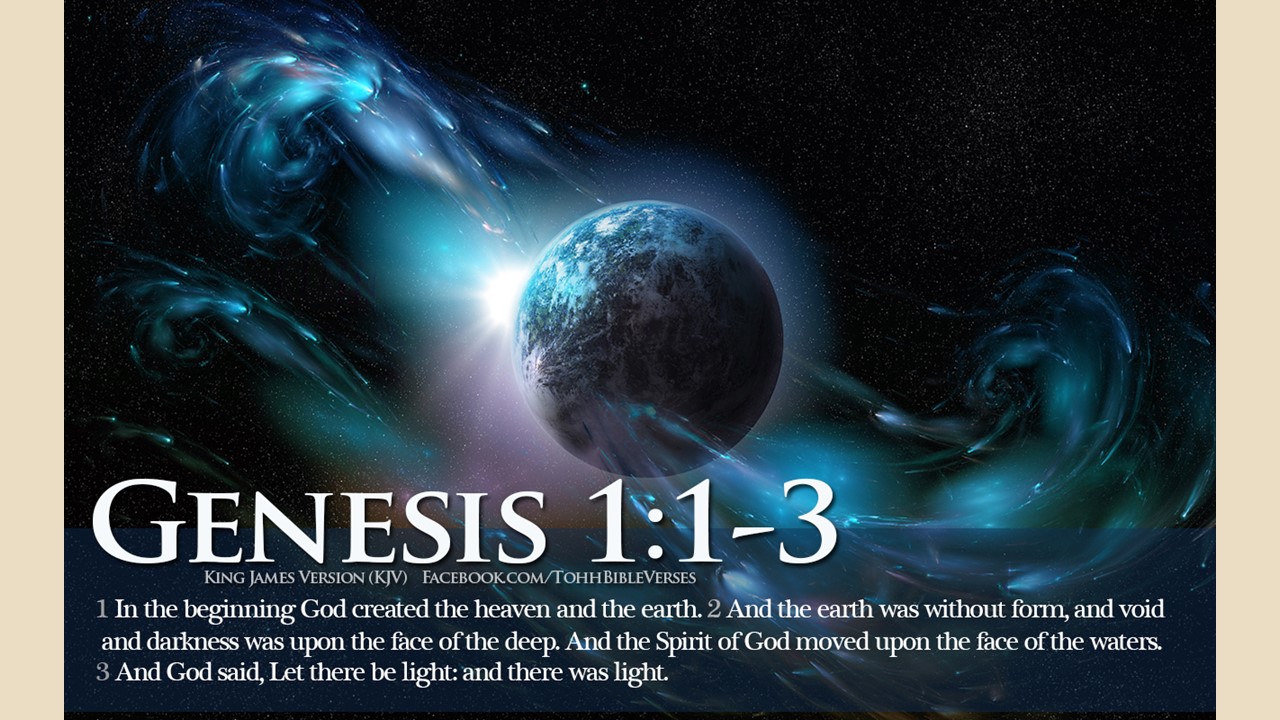
God made another change during the time of Noah. He flooded the earth to remove the unrighteousness. Destroyed every living creature except those rescued in the ark. Afterward, you may recall, God put a rainbow in the sky as a promise to Noah that He would never again destroy the world by water.
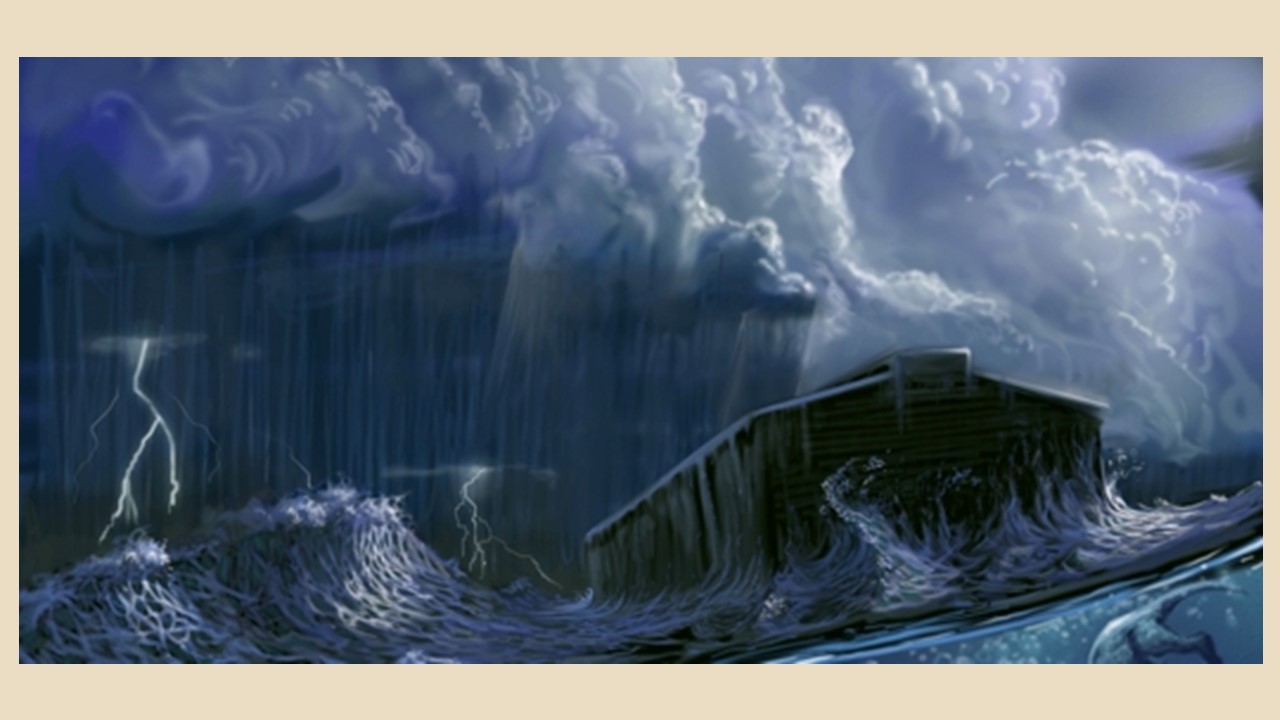
But He will one day destroy it by fire. In Psalm 50:3, David said,
Our God comes
and will not be silent;
a fire devours before him,
and around him a tempest rages.
He summons the heavens above,
and the earth, that he may judge his people:
“Gather to me this consecrated people,
who made a covenant with me by sacrifice.”
And the heavens proclaim his righteousness,
for he is a God of justice.
So not only are the scoffers wrong, but the scoffers know they’re wrong. God has indeed judged the world before, and He will judge the world again. And to the true Christians listening to Peter, don’t believe the scoffers. Resist the call of the scoffers to party like it’s 1999, and rest instead on truth.
And what is the truth? The truth is that Jesus will come again. Peter’s writings are an introduction to eschatology, which is the study of the end of time, a study of the end of the world. Christian eschatology is the study of the destiny of humankind as revealed by the bible, including death and the afterlife, Heaven and Hell, the Second Coming of Jesus, the Resurrection of the Dead, the Rapture, the Tribulation, Millennialism, the end of the world, the Last Judgment, and the New Heaven and New Earth of the World to Come.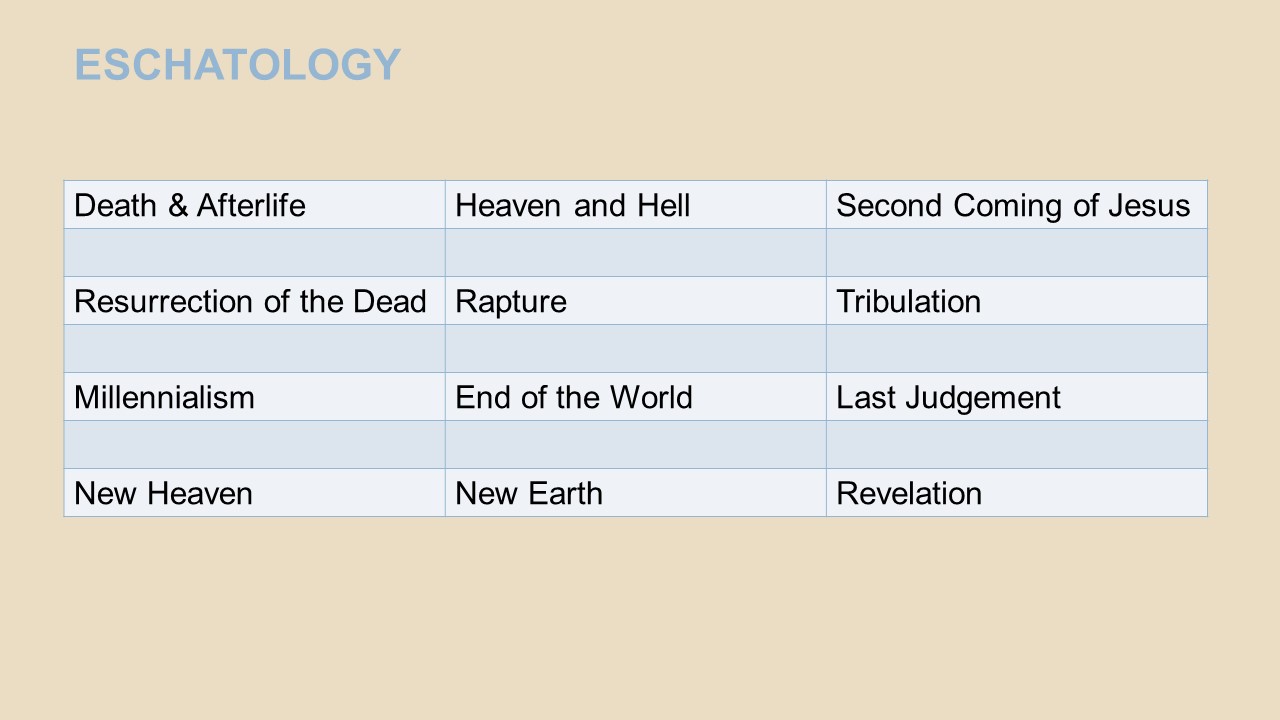
The word eschatology comes from two unpronounceable Greek words eschatos (ἔσχατος) which means “last,” and logeia (λογία), which means “the study of,” or more accurately, “a collection.” These words are unpronounceable and even harder to write down. It’s like Greek to me.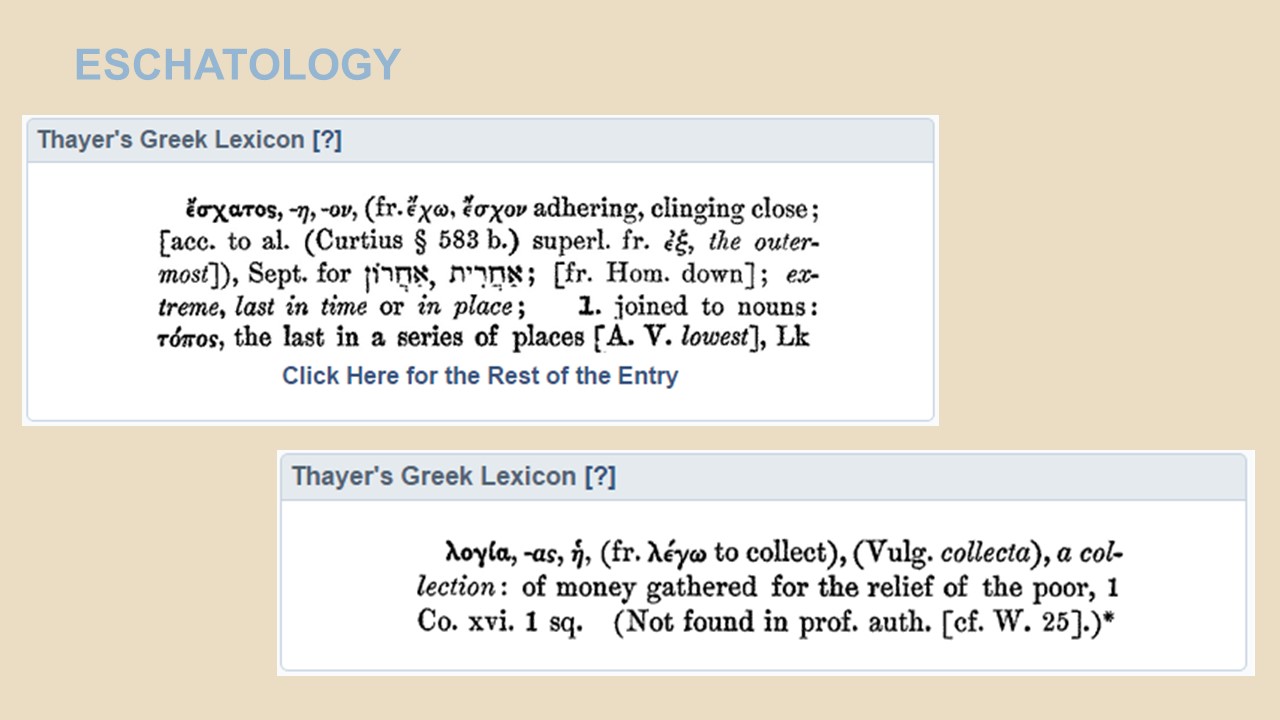
Before the resurrection of Jesus, there were two main Jewish viewpoints on what happens to people after death. The Sadducees recognized only the Torah, which are the first five books of the Old Testament. According to the historian Josephus, the Sadducees believed that the soul is not immortal; there is no afterlife, and there are no rewards or penalties after death. One just ceased to be.
This was a major point of contention with the Pharisees, who accepted not only the Torah, but also the Oral Law which eventually became the Mishna and the Talmud. The Pharisees accepted, for instance, the Book of Daniel, and in Daniel 12:2 it says,
Multitudes who sleep in the dust of the earth will awake: some to everlasting life, others to shame and everlasting contempt.
Even today, not all Christians have the same beliefs in the afterlife. Seventh Day Adventists teach that upon death, the soul sleeps and is reawakened at the Resurrection. Catholics teach that one enters into heaven either immediately or through a purification known as Purgatory, or immediately into Hell. Most Protestants believe that Christ removed all obstacles and there is nothing we can add or take away, Christ paid for all of our sins and we enter directly into the presence of God after death.
Regardless, Peter emphasizes that there will indeed come a day of judgment and destruction of the ungodly. Even though scoffers may ridicule them and party like there’s no tomorrow, Christians can be confident in Jesus’ return. And today, Christians are still surrounded by the ungodly, by partiers, by pagans and New Age type beliefs. When is this day of judgment going to come? What is God waiting for?
III. Be Aware and Behave, 2 Peter 3:8-13
I’m glad you asked that, because Peter addresses that in the next few verses. In 2 Peter 3:8-13,
But do not forget this one thing, dear friends: With the Lord a day is like a thousand years, and a thousand years are like a day. The Lord is not slow in keeping his promise, as some understand slowness. Instead he is patient with you, not wanting anyone to perish, but everyone to come to repentance.
But the day of the Lord will come like a thief. The heavens will disappear with a roar; the elements will be destroyed by fire, and the earth and everything done in it will be laid bare.
Since everything will be destroyed in this way, what kind of people ought you to be? You ought to live holy and godly lives as you look forward to the day of God and speed its coming. That day will bring about the destruction of the heavens by fire, and the elements will melt in the heat. But in keeping with his promise we are looking forward to a new heaven and a new earth, where righteousness dwells.
We like the idea that God judges the guilty, as long as it’s other people he’s judging. We’re less enthused about God judging us, and if we’re honest, we know we’re not innocent people. Thankfully, we have a Savior. Since we’re saved, we should have no fear of the Day of the Lord. So what is God waiting on? We’re surrounded ungodly everywhere we turn.
The answer is found in God’s unfailing love. God’s love begins with the very first definition of love found in 1 Corinthians 13:4. Love is patient, love is kind. God so loved the world that He gave his only begotten son. God made man in His image. And God withholds the Judgment of the Day of the Lord so that no one will perish.
Remember Abraham trying to bargain with God not to destroy Sodom? The Lord said that their sin was so severe that He was going to destroy Sodom. Abraham said, “Will you kill the righteous with the wicked?” God said to Abraham, “If I can find 50 righteous people in the entire city of Sodom, I will spare them.”
Abraham started dealing. “How about forty-five? Thirty’s a good number. Twenty is even better. How do you feel about only ten righteous people?” But when Abraham arrived in Sodom, all he found was wickedness. He couldn’t find even 10 righteous people. It was only then that God destroyed Sodom.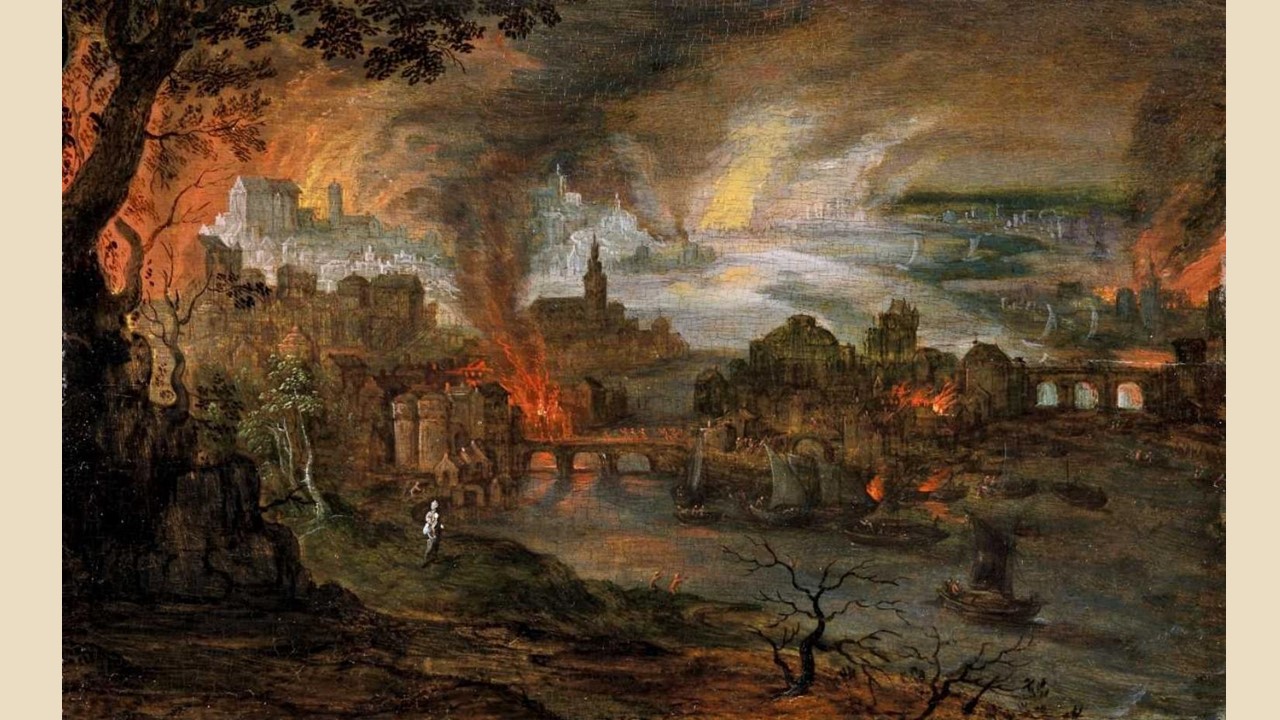
And how about the story of Noah and the Flood? God saved Noah and his righteous family, then sent a flood to wash the world of its wickedness. Afterward, Noah plants a vineyard, gets drunk, and passes out naked. And Noah was the righteous one. Can you even imagine the wickedness that was washed away?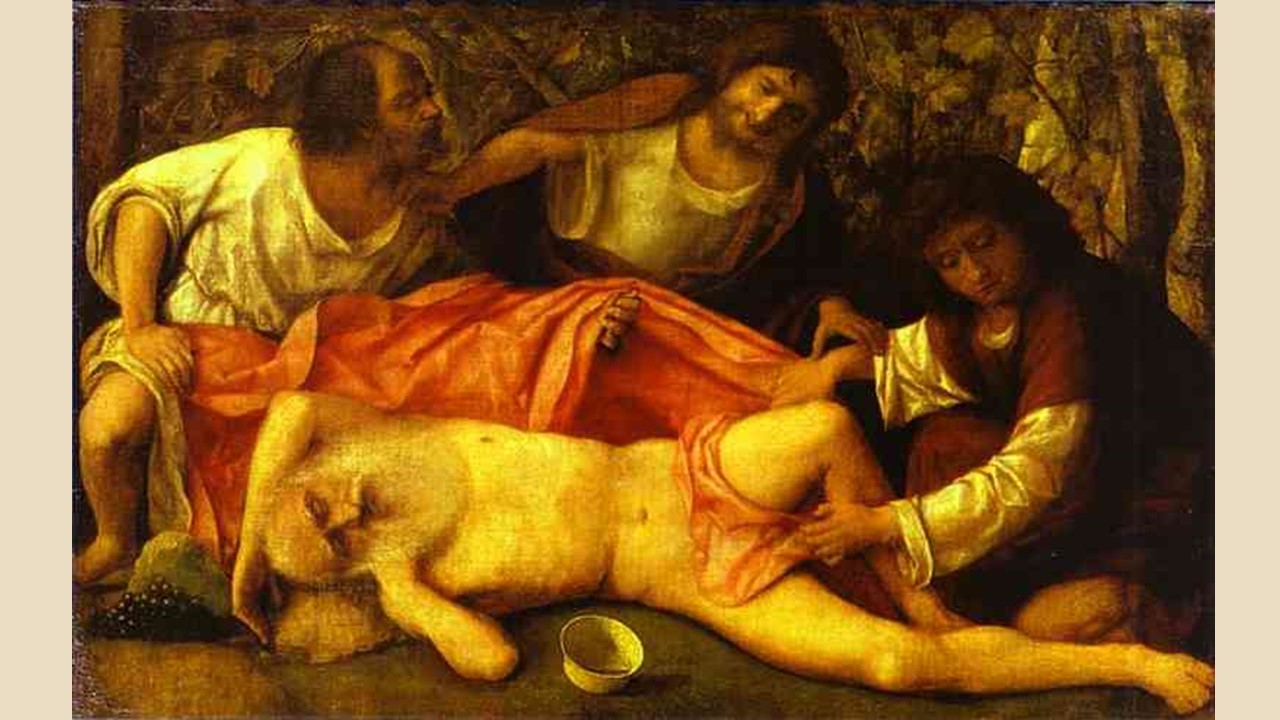
Eventually, God’s perfect love and patience will eventually be overcome by His perfect justice. He cannot let evil prevail. And on that day, we won’t have any warning. The Day of the Lord will come like a thief.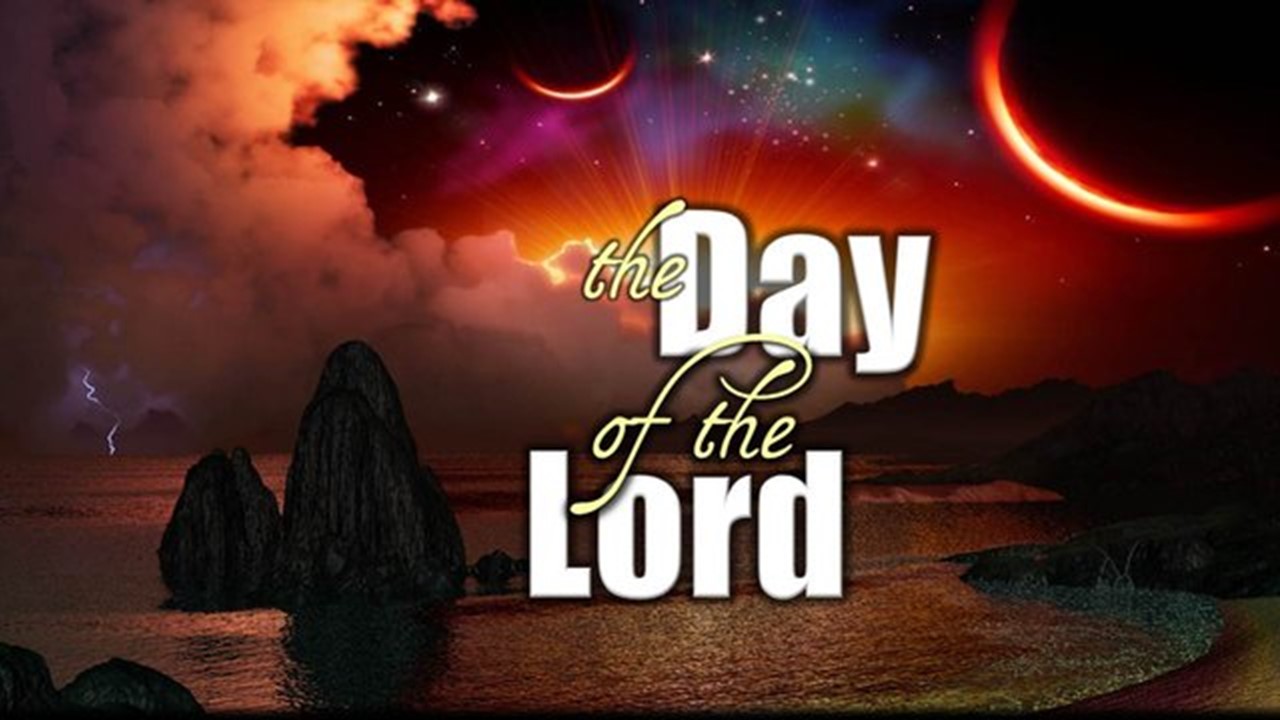
Peter uses the phrase “Day of the Lord” which was an Old Testament phrase for the final judgment. Isaiah used it, Isaiah 13:9 –
See, the day of the Lord is coming
—a cruel day, with wrath and fierce anger—
to make the land desolate
and destroy the sinners within it.
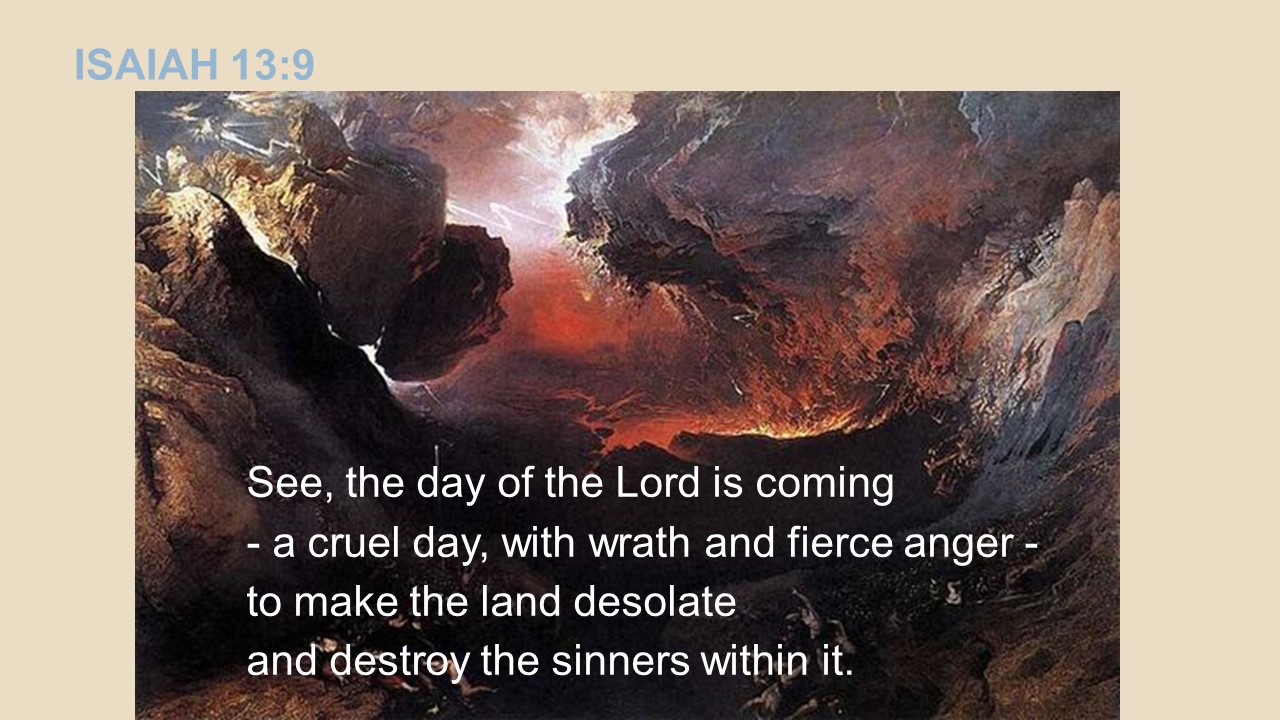 And in Joel 2:1,
And in Joel 2:1,
Blow the trumpet in Zion;
sound the alarm on my holy hill.
Let all who live in the land tremble,
for the day of the Lord is coming.
 And then again in Zephaniah 1:14 and Malachi 4:5. But Amos 5:18-24 seems especially apropos, directed at the so-called religious who were not living righteously –
And then again in Zephaniah 1:14 and Malachi 4:5. But Amos 5:18-24 seems especially apropos, directed at the so-called religious who were not living righteously –
Woe to you who long
for the day of the Lord!
Why do you long for the day of the Lord?
That day will be darkness, not light.
It will be as though a man fled from a lion
only to meet a bear,
as though he entered his house
and rested his hand on the wall
only to have a snake bite him.
Will not the day of the Lord be darkness, not light—
pitch-dark, without a ray of brightness?
I hate, I despise your religious festivals;
your assemblies are a stench to me.
Even though you bring me burnt offerings and grain offerings,
I will not accept them.
Though you bring choice fellowship offerings,
I will have no regard for them.
Away with the noise of your songs!
I will not listen to the music of your harps.
But let justice roll on like a river,
righteousness like a never-failing stream!
So for the non-righteous Jews, for the antinomians who abused their freedom in Christ, the Day of the Lord is the day God’s righteous anger punishes evil.
When will this happen? Only God knows when this will be. God created the universe, and one day He will bring it to an appropriate end. Jesus told us this day would come (Matthew 24:14), that we should watch for the signs (Matthew 24:29-30), and the timing will be according to God (Matthew 24:36). It’s been 2000 years since Jesus, and that seems like a long time, but God doesn’t exist in time the way we do. God is outside of time, and “With the Lord a day is like a thousand years, and a thousand years are like a day .”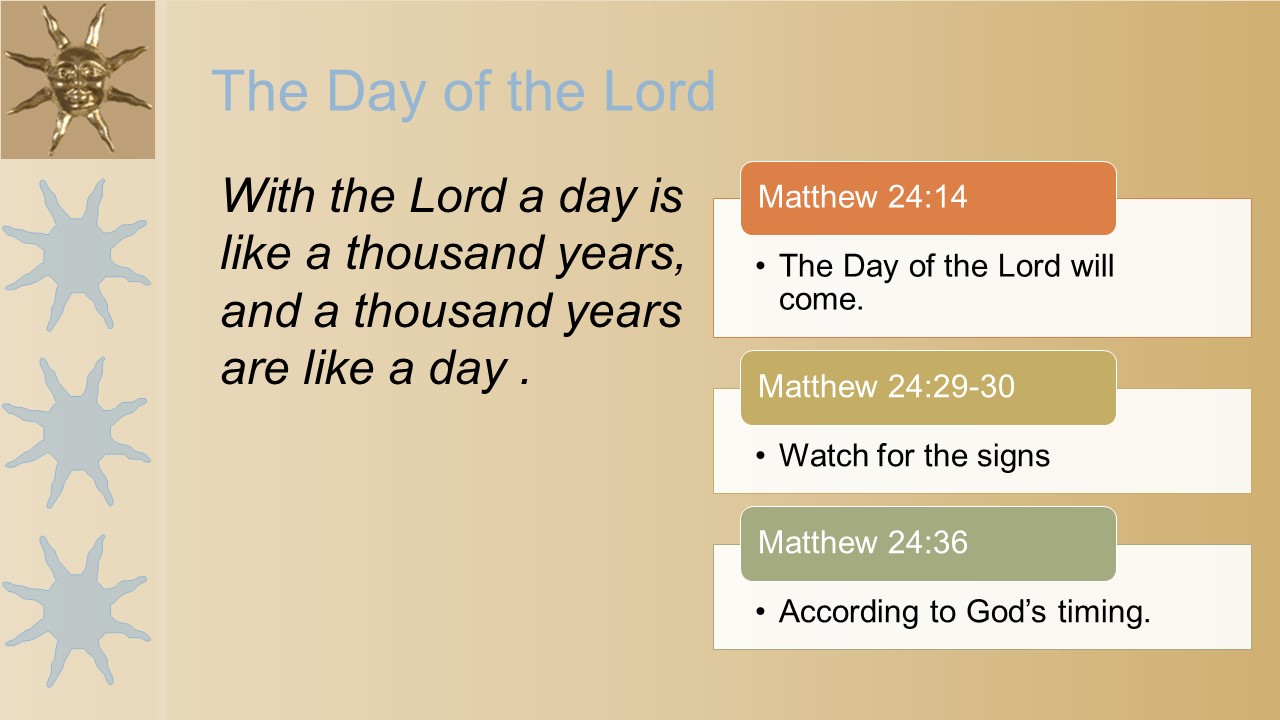
We’re aware this day is coming. The Rapture, the Great Tribulation, the Book of Revelation describes it in great detail. So what do we do in the meantime? We live with the expectancy that this day could come at any time. Peter tells us to live holy and godly lives.
Why is that important? I think first of all, living a holy life enables the Holy Spirit to work within us. We’re here, each and every one of us, for a purpose that only we can fulfill. When we live in the Spirit, we’re attuned to God’s direction; it’s easier to obey because it’s easier to listen. We find it easier to understand that it’s not happiness that God wants from us, but righteousness. But when we seek first His righteousness, then all these things, including happiness, will be given unto us. Living a holy life demonstrates the Spirit lives within us.
And when the Spirit lives within us, then we demonstrate to others the spirit lives within us. We demonstrate that righteous living brings godly blessings; we exhibit the fruits of the Spirit of love, joy, peace, patience, kindness, goodness, faithfulness, gentleness and self-control. And we do this to draw others to Christ, because God does not want anyone to perish, but for everyone to come to repentance.
IV. Work and Watch Out, 2 Peter 3:14-18
While waiting for the Day of the Lord, we must work at being a pure people, guarding against erroneous ideas. In the last part of 2 Peter 3, he says,
So then, dear friends, since you are looking forward to this, make every effort to be found spotless, blameless and at peace with him. Bear in mind that our Lord’s patience means salvation, just as our dear brother Paul also wrote you with the wisdom that God gave him. He writes the same way in all his letters, speaking in them of these matters. His letters contain some things that are hard to understand, which ignorant and unstable people distort, as they do the other Scriptures, to their own destruction.
Therefore, dear friends, since you have been forewarned, be on your guard so that you may not be carried away by the error of the lawless and fall from your secure position. But grow in the grace and knowledge of our Lord and Savior Jesus Christ. To him be glory both now and forever! Amen.
These scoffers and false teachers will be with us to the end of the age. Our best defense is a good offense. And the best offense against false teaching and antinomianism is to continually seek God’s will. When we read the bible, we read first-hand how God treats his people, how God expresses His love for us, and what thoughts, words, and actions please Him.
Is it possible to live a spotless, blameless life? Of course not, but that’s not what Peter says. He says, “make every effort.” Of course we’re going to make mistakes, we’ll take the blame for something. We won’t be spotless, we’ll get spots. But that’s ok. It’s because we are fallible that we also know we need a Savior. We’re not perfect; that’s too high of a bar for us. But if we make every effort, we can be at peace because we know the Lord is pleased at our righteousness.
Sometimes we stumble here – somehow thinking this obedience is required to earn our salvation. That is absolutely false – we cannot earn our salvation. If we think we must somehow earn our salvation, we start to travel down the road of legalism.
No, we obey the Lord because it pleases Him. It’s our love returned to God. In 1 John 2, the author says,
My little children, I am writing these things to you so that you may not sin. And if anyone sins, we have an Advocate with the Father, Jesus Christ the righteous; and He Himself is the satisfaction for our sins; and not for ours only, but also for those of the whole world.
By this we know that we have come to know Him, if we keep His commandments. The one who says, “I have come to know Him,” and does not keep His commandments, is a liar, and the truth is not in him; but whoever keeps His word, in him the love of God has truly been perfected. By this we know that we are in Him: the one who says he abides in Him ought himself to walk in the same manner as He walked.
The reason we read the bible? To grow in the grace and knowledge of our Lord and Savior Jesus Christ. Because we cannot keep His word if we do not know His word. Because we cannot resist false teaching unless we know what the truth is. We must be on our guard, because our enemy prowls around like a roaring lion looking for someone to devour. Christ will come again, and when He does, we want to be safe and secure in His arms.
V. Conclusion
What have we learned today? We’ve learned that there are big words like antinomianism we’ve never heard of before. And we’ve learned that Greek is a really hard language.
But we’ve also learned that we can have faith that Jesus will come again. He’s prepared a place for us, and someday He will take us there. We learned that the secular world around us will make fun of us, scoff at us for these beliefs, but they do not know the Lord. Our Lord is full of perfect love and patience, but there will come a day where the Lord’s perfect justice will rule, and the unrighteous will be destroyed by fire. We don’t know when that will be, a day or a thousand years, but we know that day is coming. And while we wait, we are to strengthen ourselves with knowledge of His Word and obeying the Lord’s will, not out of fear or obligation, but because we love the one who first loved us.
And then we will spend an eternity in the presence of the One who loves us. That’s something good to hope for.
I’d like to conclude this message at Thanksgiving with a hymn that demonstrates both the thankfulness of the holiday season as well as an illustration of the message today from 2 Peter 3. In 1844 A.D., Henry Alford wrote this old English hymn, “Come, Ye Thankful People, Come”.
Come, ye thankful people, come, raise the song of harvest home;
all is safely gathered in, ere the winter storms begin.
God our Maker doth provide for our wants to be supplied;
come to God’s own temple, come, raise the song of harvest home.All the world is God’s own field, fruit as praise to God we yield;
wheat and tares together sown are to joy or sorrow grown;
first the blade and then the ear, then the full corn shall appear;
Lord of harvest, grant that we wholesome grain and pure may be.For the Lord our God shall come, and shall take the harvest home;
from the field shall in that day all offenses purge away,
giving angels charge at last in the fire the tares to cast;
but the fruitful ears to store in the garner evermore.Even so, Lord, quickly come, bring thy final harvest home;
gather thou thy people in, free from sorrow, free from sin,
there, forever purified, in thy presence to abide;
come, with all thine angels, come, raise the glorious harvest home.
Come, Lord Jesus, come.
To God be the glory. Amen.


Leave a comment